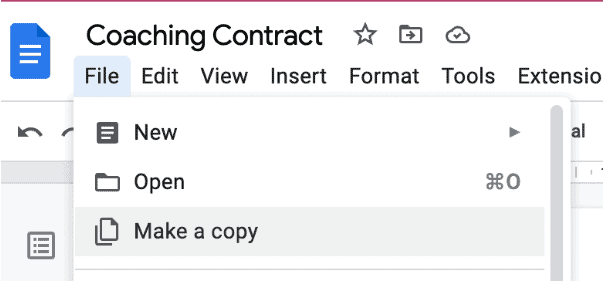If you’re a coaching professional, you need an official life coaching contract outlining your services and setting terms for your coaching partnership with your clients. It doesn’t just show that you’re serious about your coaching business, but also:
- Sets clear expectations
- Protects both you and your coachee in case of a disagreement
- Allows you to set your own rules for the collaboration
If this is your first time creating a life coaching contract, it might seem daunting. It might even make you question whether you really need to go through all this legal jargon and the headache of writing an agreement.
The answer is yes, you absolutely should never coach without a contract. But, by the end of this article, you’ll see that it isn’t as scary as it may seem.
In this guide, we’ll go through everything your life coaching agreement contract should contain so you can turn all that baffling legal mumbo jumbo into a professional coaching contract that empowers you and your life coaching business.
Please note: The information we gathered in this article should not be considered legal advice. We are coaches who’ve been in the trenches, but we’re not lawyers. If you need professional legal advice, please seek out the help of a lawyer.
If you’re a new coach, you can download our “Free Template Pack for Coaches.”
Life Coaching Contract Template: What to Include
Parties, Date, and Signatures
This is probably a no-brainer, but in order to make your own coaching contract official, you’ll need to specify two things:
- Who’s signing the contract; and
- When the life coaching agreement became official
Ensure you include the full name of both you (or your coaching business) and your coachee, as well as your registered physical address. Add the date of signing (no worries about a few days of difference), and at the end, your signatures.
Paperbell handles all of these details in its included contract signing tool.

Even if your life coaching contract is just a few lines on paper, this will make the coaching relationship legally binding.
Of course, we’re not done here, so let’s move on to the other key elements of coaching agreements.
[ Read: Use These Terms and Conditions to Keep The Drama Out of Your Coaching Business ]
The Definition of Coaching Services
Coaching is a practice that’s often hard to pin down. The outcome of your life coach services depends on:
- The coachee
- Your expertise
- Your relationship with the coachee
- And so much more
The change is co-created by you and your client in coaching conversations, and it isn’t as tangible as other commonly known services.
To shed some light on what life coaching as a service is, here’s how the sample contract of the International Coaching Federation describes it:
“Life coaching is a partnership (defined as an alliance, not a legal business partnership) between the Coach and the Client in a thought-provoking and creative process that inspires the client to maximize personal and professional potential.
It is designed to facilitate the creation/development of personal, professional, or business goals and to develop and carry out a strategy/plan for achieving those goals.”
Some business services have clearer outputs than others. But life coaching gets a bit fuzzier, especially in coaching specialties like:
- Spirituality
- Emotional well-being
- Happiness coaching
Remember, you don’t have to guarantee or prove the desired change in your client’s life. A coaching relationship is a collaboration; you’re not responsible for your client’s transformation alone. What you do commit to is to carry out your services in a professional way.
Lastly, lines can get blurry between:
- Coaching
- Therapy
- Consultancy
- Mentoring
So, your coachee must understand you’re not providing therapy or a mental health diagnosis to them.
Your coaching agreements can outline the exact services you offer and don’t offer to them to make this clear.
Use of Information
Your confidentiality clause should include that all information discussed in your sessions or shared beyond the sessions stays confidential. You should also mention that you don’t store personal details about your client for identity theft protection.
This shows that you follow ethical standards in your coaching practice, even if you’re not certified.
[ Read: 3 Ready-made Coaching Disclaimer Templates to Use Today ]
It’s also worth mentioning that they are responsible for bringing honest information to the sessions, as the success of your work as a life coach is reliant on that. But of course, they are free to decide what to share or not share with you as part of the coaching work.
You can either include this in the contract or mention it to your client in person. This will benefit the coach-client relationship and ensure you both have the same goals for your life coaching journey.
The Description of Your Specific Life Coaching Services
The basis of any life coaching service agreement is the following:
- You, as a life coach, are providing services
- Your client is accepting (and normally paying for) those services
Since your life coach services are unique, you need to describe what they would involve.
If you have a well-crafted life coaching program together, that should give you a solid basis for this part of the coaching agreement.
[ Read: How To Price & Put Together High-End Coaching Packages ]
Include the following information about your coaching packages:
- How many coaching sessions are included
- How long each session will be
- Whether these sessions happen over a call online, in person, or via a combination of both
- The given time zone for meetings to establish boundaries about your availability
If you occasionally offer additional life coaching sessions for clients as you see fit, that’s okay. It’s always better to underpromise and overdeliver.
Are the following elements a core part of your coaching technique?
- Accountability (like Voxer coaching)
- Access to additional training resources (like courses or digital products)
- Group coaching
If yes, make sure to include them in your coaching contract. If these are simply bonuses or various tools to support your client as you see fit, then you don’t have to mention them.
The Duration of the Life Coaching Contract
Many of us have experienced life coach relationships dragging on for a long time or a prospective client disappearing into the mist. This is why it’s important to not only define the number of coaching sessions you offer but also set an expiry date.
It’s completely up to you if this time frame is two months or a year, but having it in your coaching contract guarantees that you keep up the momentum in your coaching relationship and get paid on time.
It will also outline the client’s responsibilities in booking sessions with you.
You will avoid a life coach’s worst nightmare (a disgruntled client) if you’re clear with your expectations from the outset.
The Fees and Payment Terms of Your Coaching Services
This is probably the most important part of your coaching agreement: Getting paid for your services on time.
Specify the following:
- The amount and currency your client needs to pay you
- Accepted payment methods to avoid confusion, especially for international payments
- Clearly defined due dates in the case of payment plans (can be exact dates or tied to session completion)
- Whether you’re requesting an advance payment to guarantee the client’s commitment
- A clause about late payment fees (flat rate or percentage) if a client misses payments
If you offer refunds, make sure you are clear on your refund policy, too. However, this is rarely something professional coaches do.
The Terms of Terminating the Coaching Relationship
What happens if your client changes their mind or if you need to step away from your life coaching practice because of some unforeseen reasons?
Hopefully, this never happens, but it’s better to be prepared than sorry:
- Define when the coaching relationship is considered terminated, such as when all agreed-upon sessions have been delivered
- Include terms for early termination, such as if the client fails to attend a certain number of sessions or breaches key parts of the agreement
- Specify what happens if the relationship is terminated midway, like keeping advance payments and having no further commitments between parties
Ensure both parties agree to the above terms before moving forward.
[ Read: How To Fire a Coaching Client ]
Rescheduling & Cancellation Policy
This is another important clause to protect yourself from being stood up as a coach and make sure your time is respected. Missed appointments shouldn’t mess with your life coaching schedule.
A common practice for life coaches is to set clear rules for all their sessions, such as a 24-hour or 48-hour rescheduling or cancellation policy.
This way, if your client needs to cancel the appointment at the last minute, they will understand that they will need to pay for it, or won’t be refunded if they’ve paid the fees already.
Miscellaneous Clauses For Your Coaching Contract
The final clause you might commonly see in life coaching contracts is the ‘miscellaneous’ section. This is normally just a section with a few additional legal requirements, such as defining under which country’s law you enter into the agreement or that you both voluntarily signed it.
This will ensure you’re legally protected by local laws in your area.
If your template has something like this, you can leave it there. Otherwise, don’t worry about it.
Life Coaching Contract Templates
We recommend using a life coaching contract template from a reliable source or an accredited coach training center. Even if it’s a well-written coaching contract template, always read through the whole agreement to ensure each section is relevant and accurate to how you provide your services.
If you’re unsure, speak to a legal advisor.
Here are a few recommended coaching contract templates to try:
- ICF coaching contract template
- Ready-made coaching contract templates from Coaches & Company
- Association for Coaching sample contracts and agreements
To make it easier for you, Paperbell has prepared a free Coaching Contract template for you. Just click the image below and make a copy of the Google Doc.

How & When To Get Your Contract Signed
The easiest way to get your coaching contract signed is to use a digital signature tool like Paperbell.
This way, you can skip printing papers and ensure the coaching agreement is legally binding.
Get the service agreements done before you begin any work with your client (except your free discovery session, of course), and make sure you have clear expectations between the two of you.
Paperbell makes it super simple to get your contracts signed by clients digitally and to have them all in one place.
Your clients will pay their advance payment when signing your coaching agreement, and Paperbell only allows them to proceed and schedule their first session once this is settled. This means you never have to chase clients for payments again, and you can easily find your contracts to refer back to later on.
The best part with Paperbell is that your contracts, payments, scheduling, and even intake forms all live on the same platform. You can even launch a beautiful coaching website within minutes! Click here to try Paperbell for free.
What Happens If Your Client Breaches Your Life Coaching Contract?
If your client disrespects the terms of your coaching agreement, the best dispute resolution is to have a conversation with them first and iron out any misunderstanding between the two of you. If they’ve missed a payment, you should absolutely stop the coaching work until that’s settled; it’s only fair. How can you run a life coaching business if you’re not getting paid?
If you cannot sort things out by yourself, you can always ask for help from a legal professional.
In most cases, though, a crisp life coaching contract agreement and a great discovery session are all you need to get on the same page with your clients.
FAQs About Coaching Contracts
Individual Coaching vs. Group Coaching: Is the Contract Different?
If you’re a group coach, your contracts will still look the same as if you’re conducting 1:1 sessions. You’re still agreeing with each client individually about the terms. You can mention any group coaching sessions and other elements of your coaching program in your contract.
What Should a Coaching Contract Include?
Your coaching contract should include the name and address of both you and your clients, what services you’ll deliver, how much you’ll get paid, and your terms about contract termination and session cancellation.
How Do You Write a Coaching Agreement?
Start with one of the coaching templates shared above. Make sure you always read through each clause of your sample agreement and modify it according to your terms and services. You can use AI services like LegalOn to get initial guidance on contract language and structure.
Where Should I Store My Coaching Contracts?
Paperbell handles your contract signing and stores your contracts for each client in your all-in-one client hub. You can always access any client information here about agreements, materials shared, sessions booked, and payments processed for each person you work with.
What Happens If My Client Isn’t Willing to Sign the Contract?
You should never start coaching without a signed contract. If your client is unwilling to sign the agreement, you should refuse to work with them. Once the contract is signed, neither you nor your client can request modifications. Once your signatures are there, the agreement is legally binding.
Create A Simple Coaching Contract
So that’s it; it’s time to get your life coaching contract up-to-date and ready for your next client to sign.
Having a contract ready to go will save time in the long run and show your clients how professional you are. That way, all you need to focus on is what you love doing the most: Helping your clients get to where they want to be.
Want to get a professional coaching website up and running in minutes? Click here to try Paperbell for free.

Editor’s Note: This post was originally published in March 2023 and has since been updated for accuracy.









